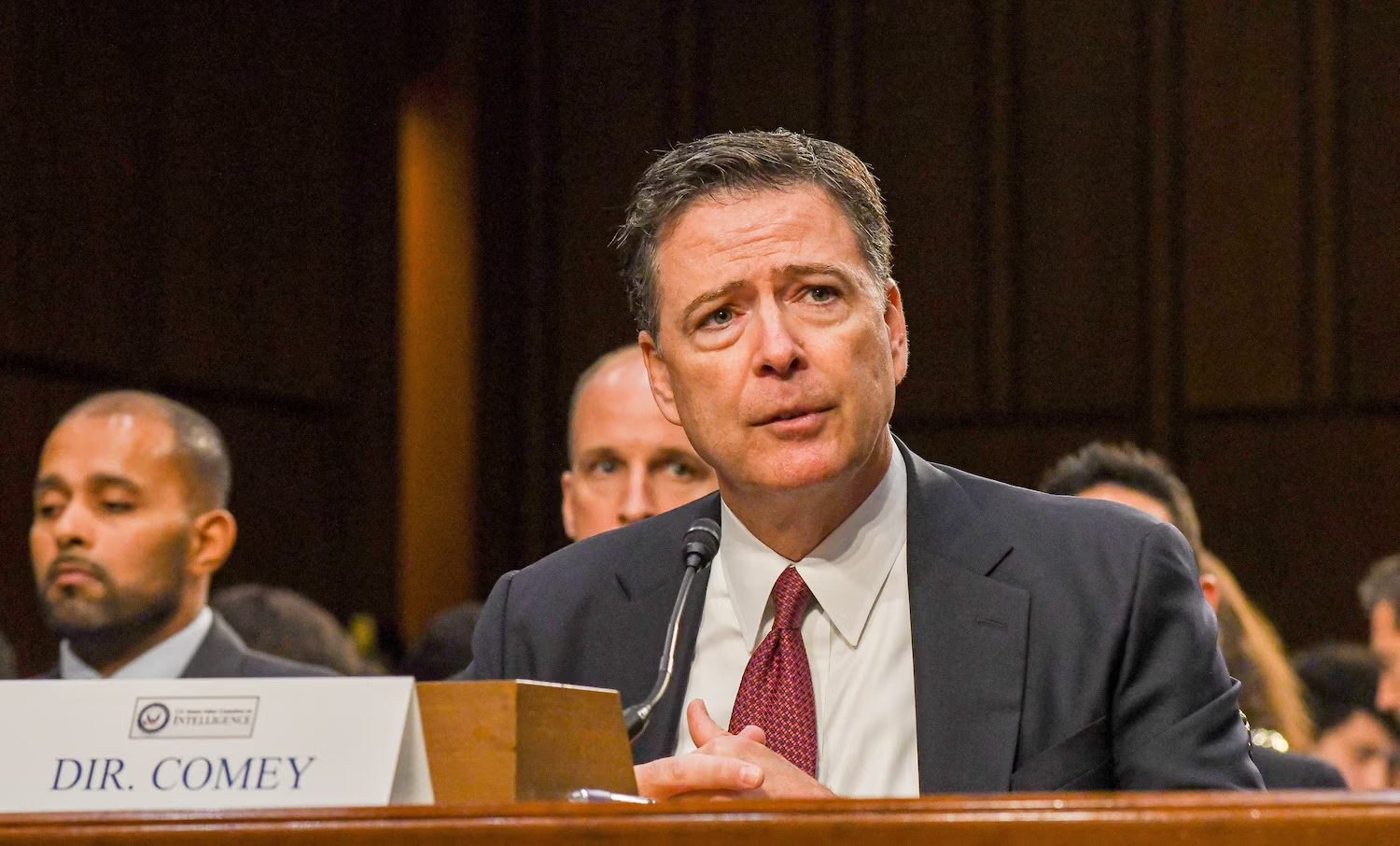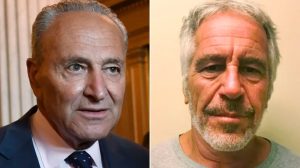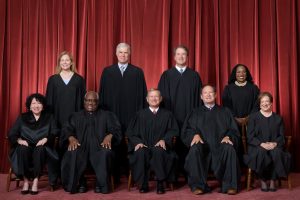A high-stakes legal battle intensified on Monday after a federal judge temporarily froze an explosive order that would have forced the Department of Justice to hand over rare grand jury materials to former FBI Director James Comey. The decision offers a brief reprieve for U.S. Attorney Lindsey Halligan, even as the court sharply criticized her handling of the case and raised pointed concerns about prosecutorial conduct.
The unfolding dispute has cast new light on internal turmoil within the DOJ, questioned the integrity of the Comey indictment, and rekindled debate over political influence in high-profile prosecutions. With both the government and Comey’s defense preparing rapid-fire legal filings, the stakes could not be higher.
A Dramatic Reversal Just Hours After Scathing Rebuke
The day began with a stunning ruling from U.S. Magistrate Judge William Fitzpatrick in Alexandria, Virginia. In a sharply worded opinion, he accused prosecutors of committing “profound investigative missteps” that may have tainted the grand jury proceedings that led to Comey’s indictment.
Fitzpatrick went so far as to order the DOJ to hand over:
-
All grand jury transcripts
-
Related recordings
-
Supplemental investigative materials
to Comey’s defense attorneys — calling the disclosure an “extraordinary remedy” justified only by “unique circumstances.”
But by Monday evening, U.S. District Judge Michael Nachmanoff had issued a temporary stay at the DOJ’s request. The pause gives prosecutors a narrow window to file formal objections, with the government’s written response due Wednesday and Comey’s defense reply due Friday.
For now, the government has avoided the unprecedented release of grand jury documents — but Fitzpatrick’s allegations remain on the record, and they are explosive.
Judge Fitzpatrick: “A Disturbing Pattern of Profound Investigative Missteps”
The magistrate judge’s findings paint a troubling picture of errors, oversight failures, and questionable legal calls.
According to Fitzpatrick, the record shows:
-
Erroneous instructions given to grand jurors
-
Mishandling of warrants and seized evidence
-
Misstatements by prosecutors, including two attributed directly to Halligan
-
An FBI agent possibly exposed to materials protected by attorney–client privilege
-
A case that appeared “slapdash” and improperly sequenced
“These missteps led an FBI agent and a prosecutor to potentially undermine the integrity of the grand jury proceeding,” Fitzpatrick wrote.
He accused the government of taking the reckless approach to “indict first, investigate second.”
The findings stunned legal analysts who noted how rarely a judge scolds prosecutors so publicly — and even more rarely demands grand jury disclosure as a corrective measure.
Who Is Lindsey Halligan — and Why the Sudden Scrutiny?
U.S. Attorney Lindsey Halligan, appointed in September, has been the subject of internal DOJ chatter due to:
-
Limited prior criminal litigation experience
-
A rapid rise into a politically sensitive case
-
Concerns about improper briefings
-
Questions about whether she followed proper warrant procedures
Fitzpatrick’s ruling suggests Halligan may have provided incorrect instructions to grand jurors and mishandled evidence review protocols, potentially jeopardizing the entire prosecution.
Such errors do not merely weaken a charge — they can result in full dismissal if the misconduct is deemed severe enough.
A Failed First Attempt: Grand Jury Originally Rejected a Three-Count Indictment
One revelation buried in Fitzpatrick’s order is that an earlier grand jury declined to indict Comey on a broader three-count set of charges.
Only after the DOJ returned with a slimmer, two-count indictment — focusing on false statements and obstruction of a congressional proceeding — did prosecutors secure a case.
That earlier rejection raises a major question: Was the DOJ rushing, or fishing, for charges?
Reuters, summarizing Fitzpatrick’s decision, reported that the court specifically highlighted legal missteps in Halligan’s conduct and the troubling testimony of one FBI agent whose access to privileged materials may have compromised the case.
Comey Claims Political Retaliation: “A Vendetta, Not a Case”
James Comey, who served as FBI director from 2013 to 2017, has pleaded not guilty to both charges. His legal team insists the prosecution is “politically motivated” and amounts to retaliation for his role in investigating former President Donald Trump’s 2016 campaign.
Comey argues:
-
He did not authorize leaks
-
His congressional testimony was truthful
-
The charges represent “personal spite” from the Trump administration
The DOJ has rejected those claims, but the allegations of prosecutorial misconduct are giving Comey’s defense significant leverage — and potentially grounds to dismantle the indictment.
More Trump Critics Under Indictment: A Pattern or Coincidence?
Comey is just one of several high-profile Trump critics recently charged:
-
John Bolton, former National Security Adviser
-
Letitia James, New York Attorney General
Both have argued, like Comey, that they were targeted for political reasons.
Whether these cases represent legitimate prosecutions or politically charged tactics remains a deeply divisive question — one that Fitzpatrick’s scathing order may thrust back into public debate.
DOJ Response: “We Will Vigorously Defend the Integrity of the Proceedings”
Even as the department declined to comment directly on Fitzpatrick’s opinion, a spokesperson insisted the DOJ intends to defend its case forcefully.
Behind the scenes, however, multiple officials are reportedly uneasy about the optics of a judge accusing prosecutors of mishandling a politically sensitive case involving a former FBI director.
One former federal prosecutor, speaking anonymously, told reporters:
“This is highly unusual. Grand jury secrecy is sacrosanct — if a court orders disclosure, it means the judge believes the government crossed a serious line.”
That line, according to Fitzpatrick, has already been crossed.
What Happens Next — and Why It Matters
The DOJ has until Wednesday at 5 p.m. to file objections to the magistrate judge’s ruling. Comey’s team will respond Friday, after which Judge Nachmanoff will issue a final ruling on whether the grand jury materials must be turned over.
Three outcomes are possible:
1. Full Disclosure of Grand Jury Materials
A rarity in U.S. legal history. This would deal a major blow to the DOJ case and possibly lead to dismissal.
2. Partial Disclosure
Nachmanoff could allow Comey’s lawyers to review limited records or hold in-camera inspections.
3. Reversal of Fitzpatrick’s Order
The DOJ could avoid disclosure entirely — but Fitzpatrick’s warning about misconduct would remain public and politically damaging.
Either way, the case now carries implications far beyond Comey himself.
It has become a test of:
-
DOJ independence
-
Prosecutorial integrity
-
Judicial willingness to challenge the government
-
The boundaries of politically sensitive indictments
With the court spotlight now directly on prosecutorial behavior, both sides face enormous pressure heading into the next phase.

Sarah Mitchell is a bestselling novelist recognized for her insightful and emotionally resonant stories that explore the complexities of human relationships. Originally from Denver, Colorado, Sarah grew up in a family of teachers who nurtured her curiosity and love for storytelling. She studied psychology at Stanford University, where she became fascinated by the intricacies of human behavior—an interest that would later shape her writing career. Sarah’s novels are praised for their nuanced characters, intricate plots, and ability to capture the subtle tensions that define love, friendship, and family ties. Her breakthrough novel, The Spaces Between Us, became an instant bestseller, lauded for its honest portrayal of strained family relationships and the fragile bonds that hold people together. Since then, she has published several works that continue to captivate audiences around the world. Outside of her writing career, Sarah is passionate about mental health advocacy and often partners with organizations to promote awareness and support for those struggling with emotional well-being. Her personal life is quieter—she enjoys hiking in the Colorado mountains, practicing yoga, and spending time with close friends. With each new book, Sarah Mitchell cements her reputation as a writer who illuminates the beauty and struggles of human connection.









